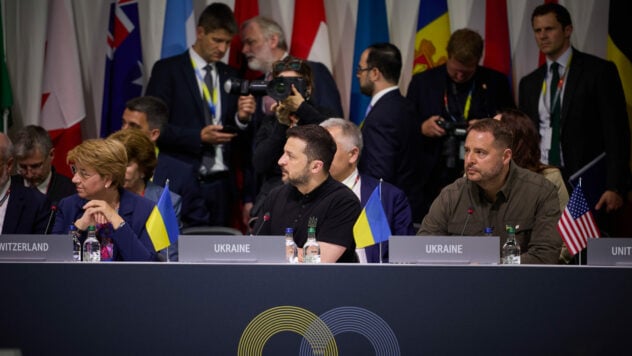Following the Peace Summit in Switzerland, more than 80 countries and four organizations signed a joint communiqué.
Some countries did not support the final document of the conference.
Countries that supported the communiqué
President Volodymyr Zelensky showed the full list of countries that signed the document.
Now watching
Among the organizations that supported the final document were the Council of Europe, the European Commission, the European Council and the European Parliament.
Among the countries participating in the Peace Summit, the communiqué was supported by:Albania, Andorra, Argentina, Australia, Austria, Belgium, Benin, Bosnia and Herzegovina, Bulgaria, Cape Verde, Canada, Chile, Comoros, Costa Rica, Ivory Coast, Croatia, Cyprus, Czech Republic, Denmark, Dominican Republic, Ecuador, Estonia, Fiji, Finland, France, Gambia, Georgia, Germany, Ghana, Greece, Guatemala, Hungary, Iceland, Iraq, Ireland, Israel, Italy, Japan, Jordan, Kenya, Kosovo, Latvia, Liberia , Liechtenstein, Lithuania, Luxembourg, Malta, Moldova, Monaco, Montenegro, the Netherlands, New Zealand, North Macedonia, Norway, Palau, Peru, Philippines, Poland, Portugal, Qatar, South Korea, Romania, Rwanda, San Marino, Sao Tome and Principe, Serbia, Singapore, Slovakia, Slovenia, Somalia, Spain, Suriname, Sweden, Switzerland, East Timor, Turkey, Ukraine, United Kingdom, United States, Uruguay and the Republic of Botswana.
Which countries did not support the Summit communiqué world:
- Armenia;
- Bahrain;
- Columbia;
- India;
- Indonesia;
- Libya;
- Mexico;
- Saudi Arabia;
- South Africa;
- Thailand;
- United Arab Emirates.
Some of the countries and organizations that were observers probably did not sign the document either. For example, Brazil, the Vatican, and the UN.
Key Provisions of the Peace Summit Communiqué
The signatories of the final document defined a common vision on the following important aspects:
1) Any use of nuclear energy and nuclear facilities must be safe, secure, well-guarded and environmentally friendly, and Ukrainian nuclear power plants and facilities, in particular the Zaporizhzhya Nuclear Power Plant, must operate safely and securely under the full sovereign control of Ukraine and in accordance with the principles of the IAEA and under its supervision.
Any threat or use of nuclear weapons in the context of the war in Ukraine is unacceptable.
2) Global food security depends on uninterrupted food production and supply.
In this regard, free, full and safe commercial shipping, as well as access to seaports on the Black and Azov Seas, are of the utmost importance. Attacks on merchant ships in ports and along their entire route, as well as on civilian ports and civilian port infrastructure, are unacceptable.
Food security must in no way be used as a weapon. Ukrainian agricultural products must be supplied safely and freely to interested third countries.
3) All prisoners of war must be released through full exchange. All deported and illegally displaced Ukrainian children and all other Ukrainian illegally detained civilians must be returned to Ukraine.
— We believe that achieving peace requires engagement and dialogue between all parties. We therefore decided to take specific measures in the above-mentioned areas in the future, with the subsequent engagement of representatives of all parties, — the communique says.

